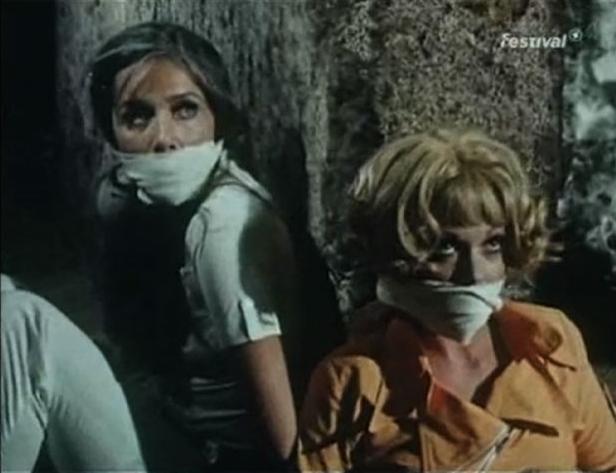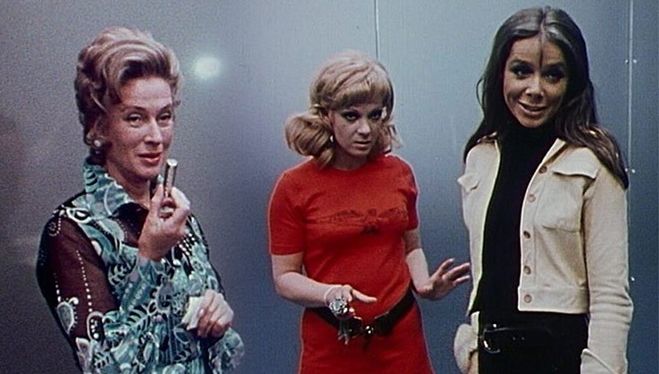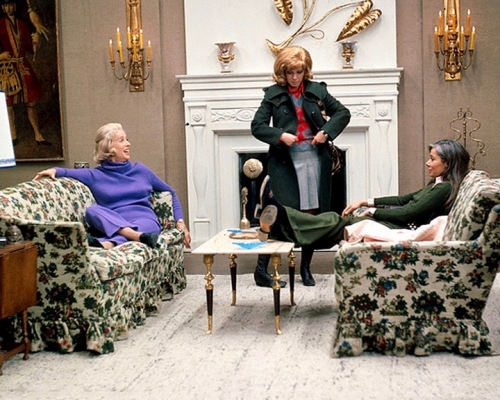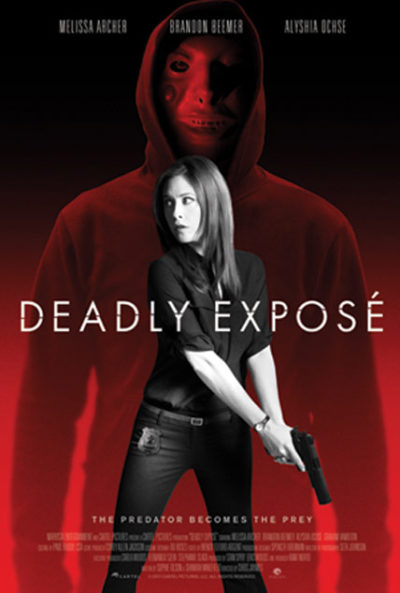★★★
“Two Angels for Europol?”
“Brussels: home to many European authorities. This one is new. It’s an international combination of security forces from European countries: EUROPOL. For a long time the criminal underworld hasn’t respected borders, and continually develops new techniques. So crimes are often committed for which the usual police methods are not enough. In such cases, Europol has trained employees who are out of the ordinary. Unconventional cops, with unconventional methods, like us. Biggi. Conny. And our boss is a lady! Her name is S.I.R. – S for ‘Sicherheit’ (security), I as in ‘Information’, R for ‘Recht’ (justice).”
 What sounds like a mid-60s promotion intro to The Avengers (John Steed + Emma Peel, not the other ones!) is indeed a spoken monologue. And it leads into one of the strangest oddities in the “girls with guns”-subgenre, which still can surprise me when I dig out something new. Now, I don’t want to summarize the whole of German film-making history, but I think a couple of words would actually be quite helpful in this case, before we get under way.
What sounds like a mid-60s promotion intro to The Avengers (John Steed + Emma Peel, not the other ones!) is indeed a spoken monologue. And it leads into one of the strangest oddities in the “girls with guns”-subgenre, which still can surprise me when I dig out something new. Now, I don’t want to summarize the whole of German film-making history, but I think a couple of words would actually be quite helpful in this case, before we get under way.
Early German movie-making had a very high interest in the fantastic film genre. Indeed, you could actually say the fantastic film was born in Germany with such early and successful cinematic efforts as Der Golem (1920), The Cabinet of Dr. Caligari (1920), the Doctor Mabuse films, Metropolis (1927), Die Nibelungen (1924) and Nosferatu (1922). With the rise of the National Socialists in the 1930s such topics suddenly became problematic. No oppressive regime ever likes people to be able to dream. The fantastic genre is a kind of escape no dictatorship can control, and that’s why they hate these things. However, the mindset stayed prevalent for a long time in Germany after World War II.
As a result, things such as comics or science fiction literature were usually seen as suspicious in the 1950s. Germany only slowly rediscovered its ability to dream on film and TV in the 1960s, during that beautiful period that gave us Karl May westerns, the Spessart Ghost comedies, new Doctor Mabuse movies and the Edgar Wallace series. It was really a very productive time in the German film industry. Then, suddenly, in the late 60s – not just here but worldwide – films seemed to hit a roadblock due to a stronger focus on politics than on popular culture by the younger generation. In Germany the old movies were abandoned as “Papas Kintopp” (“father’s cinema”). The young generation which discovered the Nazi era was being glossed over in their history classes, rejected what that generation offered, and went on to create their own movies in the 70s, very often politicized and dealing with “real life issues”.
 And while American cinema gradually got its mojo back, as film makers like Spielberg, Lucas and others fully reinvented the fantastic film, that never happened to Germany. It initially suffered from state-funded “author’s cinema”, resulting in very boring movies, mostly forgotten today. But it mainly degenerated into very average and (in my personal opinion, mostly lame) TV-crime shows. They lacked the wonderful mixture of over-the-top, unambiguous heroes and villains, uncanny horror-like atmosphere and outlandish plots of the Edgar Wallace movies of the 60s.
And while American cinema gradually got its mojo back, as film makers like Spielberg, Lucas and others fully reinvented the fantastic film, that never happened to Germany. It initially suffered from state-funded “author’s cinema”, resulting in very boring movies, mostly forgotten today. But it mainly degenerated into very average and (in my personal opinion, mostly lame) TV-crime shows. They lacked the wonderful mixture of over-the-top, unambiguous heroes and villains, uncanny horror-like atmosphere and outlandish plots of the Edgar Wallace movies of the 60s.
“Krimis” suddenly became some kind of social dramas, that were more about the depiction of society’s flaws and personal backgrounds of criminals then about the creation of suspense and imagination. The kind of crime drama the German public TV channels would usually co-produce, became as exciting as a visit to a tax office. They guaranteed “realism” and rejected as childish any depiction of outlandish things. When I look at today’s German TV programs, nothing has changed since then.
Given that, I was surprised to find this little campy gem of German TV-series. Produced between 1971-72, and shown on German TV between 1973 74, the series depicts two investigators Biggi (Anita Kupsch) and Conny (Monica Peitsch). [Quick aside: “Biggi” and “Conny” were also the names of two well-known German girl-comics in the 80s] They work for a mysterious lady (Anneliese Uhlig) who seems to have no real name and works under the alias of “S.I.R,” as discussed in the intro. She lives in a luxurious villa with candlesticks, a library and what we today would probably call a prototype version of a computer.
 Upon closer inspection, I get the impression the makers of this show must have been inspired by shows from abroad. In the mid-60s, the Steed/Peel Avengers enjoyed great success on German TV screens. There was the similar themed Department S and I’m quite sure the original Mission Impossible series also ran on TV in the early 70s. Though, Okay, S.I.R. can’t for a moment compete with these much better shows, it is by German standards a miracle such a series was produced at all. The 70s in Germany still weren’t a time when anything fantastic would be embraced. Heck, when the first Star Wars came out, that movie was heavily lambasted by critics as “fascism in space” and “fantastical nonsense” that would spoil the youth.
Upon closer inspection, I get the impression the makers of this show must have been inspired by shows from abroad. In the mid-60s, the Steed/Peel Avengers enjoyed great success on German TV screens. There was the similar themed Department S and I’m quite sure the original Mission Impossible series also ran on TV in the early 70s. Though, Okay, S.I.R. can’t for a moment compete with these much better shows, it is by German standards a miracle such a series was produced at all. The 70s in Germany still weren’t a time when anything fantastic would be embraced. Heck, when the first Star Wars came out, that movie was heavily lambasted by critics as “fascism in space” and “fantastical nonsense” that would spoil the youth.
In this TV series, the two good-looking girls usually get called to a new investigation by means of a beeping ring. They meet up with S.I.R., who comes across like a female “M”, 22 years before Judy Dench arrived on the scene. They’re then sent off to investigate strange occurrences. These usually turn out to be the machinations of criminals, using strange gadgets or methods that would make any John Steed-Emma Peel screenwriter happy.
Let me give you some examples. A computer which can hypnotize people; a club for people who enjoy stolen paintings; an artist who steals a woman’s hair; fake nuns that create fake relics, and so on. One episode features a female gang who use subliminal influence through television, in order to put women in top company positions. They do this to gain access to financial means and further feminism: I guess some things never get old! ;-)
The budget can’t have been high. Considering that these two investigators work for a European authority in Brussels, it’s strange how the series usually takes place in and around Munich – with the few exceptions when the show allowed them to look into a case in Italy! It has to be said, the girls don’t really go in with guns blazing. Usually they take weapons from the villains or their goons, to gain the upper-hand. Though it isn’t too difficult, since the villains in these 25-minute episodes are not so smart, and make mistakes that really make you shake your head. Mind you, the girls are not exactly subtle in their investigative technique either…
 The series is mainly what we would call “camp” today. It’s a very odd TV relic from the early 70s, though I had a lot of fun watching the series. Just to see the hairstyles, fashion, cars or interior designs of that time is always a marvel to behold for me! The girls themselves… truth is, they both lack a bit charisma. One would wish for them to have some good banter, clever lines of dialogue, tongue-in-cheek humor – or at least some slightly believable fighting choreography, like Miss Peel in The Avengers.
The series is mainly what we would call “camp” today. It’s a very odd TV relic from the early 70s, though I had a lot of fun watching the series. Just to see the hairstyles, fashion, cars or interior designs of that time is always a marvel to behold for me! The girls themselves… truth is, they both lack a bit charisma. One would wish for them to have some good banter, clever lines of dialogue, tongue-in-cheek humor – or at least some slightly believable fighting choreography, like Miss Peel in The Avengers.
But I can’t really judge such a series negatively on the basis of a comparison to British TV series, considering it essentially stands alone in German TV history [there were a couple of other series at the time that flirted with the fantastic, but as far as I know, this was the only one with female leads]. And as German TV of the time, they are sympathetic nevertheless, Biggi usually playing the decoy with her female charms. She’s a bit too confident of her appeal, but of course that’s entirely subjective.
I personally preferred Peitsch’s Conny, who sometimes also gets into a criminal group’s business, disguised and/or with an alias. Especially in the beginning, the stories unfold quickly, sometimes so quickly you wonder if they make much sense at all, or if some important explanations has been forgotten. It gets better as the series progresses. There is often a reward for the girls at the end of an episode, though for a number of reasons they aren’t allowed to take it, and S.I.R. invests it back into the organization.
Anita Kupsch, a Berlin theatre actress, would become more well-known at the end of the 80s when she played the secretary of Günther Pfitzmann in medical series Praxis Bülowbogen. I only know Monika Peitsch due to her damsel-in-distress role in Edgar Wallace movie The Hunchback of Soho (1966), which also featured Anneliese Uhlig, the S.I.R. of the series. The real famous name in the cast is music composer Klaus Doldinger, who would go on to compose soundtracks for movies such as Das Boot and The Neverending Story. There are also quite a number of well-known German actors guest-starring over the 32 episodes of the show, though none of international renown.
 While today’s viewers may look, with some amusement, down on this strange German attempt at being different, at the time it was produced this was groundbreaking. The idea of women taking over the investigator’s job was absolutely unthinkable for Germany at that time. It would take five more years, until 1978, before the first female police inspector would appear in Tatort (an extremely long-running and realistic crime investigation series, still being made today). That would eventually help lead to a lot of TV-Krimi series of female police investigators in the 1990s.
While today’s viewers may look, with some amusement, down on this strange German attempt at being different, at the time it was produced this was groundbreaking. The idea of women taking over the investigator’s job was absolutely unthinkable for Germany at that time. It would take five more years, until 1978, before the first female police inspector would appear in Tatort (an extremely long-running and realistic crime investigation series, still being made today). That would eventually help lead to a lot of TV-Krimi series of female police investigators in the 1990s.
Meanwhile, these two heroines very often worked “undercover”, used fake identities to get close to the baddies, had their own cars, flirted without marrying (yes, I know: scandalous!) and being… what we would call today a normal single woman. It’s easy to to forget how unusual such a life-style used to be, not that long ago. As ridiculous as this series may appear, it came out 3 years before Charlie’s Angels and 8 before Cagney & Lacey. At the time, it was quite unnatural for a “normal” TV show to feature women in this kind of position. Though, admittedly, British shows such as The Avengers, as well as American ones like The Girl from U.N.C.L.E. and Honey West had been there before – albeit with a much higher budget and often not having to deal with a 30 minutes limit for every episode.
Also, at the time of the series’ release (1973) the whole idea of “Europol” was indeed Science Fiction: In reality the decision to create this organization was made as late as 1992 and the authority didn’t became a reality until 1999. So, yes, one can actually call this series kind of prophetic! Overall, I give Okay, S.I.R. three stars. One for being ahead of its time, one for the wonderful weird campiness of the 70s style and one for trying to emulate the style of shows like The Avengers and Mission Impossible – even if they were, admittedly, better able to pull it off.





 ★★½
★★½ When you think of drugs, terrorism and South America, Colombia probably comes first to mind, thanks to Pablo Escobar and his cartel pals. However, it’s far from the only country in the region with a troubled history. Peru has had its fair share of strife: it produces virtually as much cocaine, and the Marxist guerillas of the Shining Path movement fought a long, bloody war against the government through the eighties. It’s during this time that the novel begins. Young girl Nina has her father killed by soldiers hunting the guerillas in her rural village, and her brother Miguel vanishes to join the Shining Path.
When you think of drugs, terrorism and South America, Colombia probably comes first to mind, thanks to Pablo Escobar and his cartel pals. However, it’s far from the only country in the region with a troubled history. Peru has had its fair share of strife: it produces virtually as much cocaine, and the Marxist guerillas of the Shining Path movement fought a long, bloody war against the government through the eighties. It’s during this time that the novel begins. Young girl Nina has her father killed by soldiers hunting the guerillas in her rural village, and her brother Miguel vanishes to join the Shining Path. Officer Shivani Shivaji Roy (Mukerji) is part of the Serious Crimes Squad in Delhi, whose approach to policing is very much “by any means necessary.” However, she is taken out of her area of expertise when Pyaari. a young girl she has been helping goes missing from an orphanage. Everything indicates the girl has been picked up by a sex trafficking ring, run by Sunny Katyal (Verma) and his partner, Karan (Bhasin), and will soon be sold off to the highest bidder and exported out of the country. Roy has to work her way up the chain to rescue Pyaari, despite opposition both from her boss, because it’s not her responsibility, and from the gang. As she gets nearer to the top, the climb becomes increasingly hard, with the criminals making it clear they won’t take lightly the threat to their lucrative business which Roy represents. It’s also clear they have friends in high places.
Officer Shivani Shivaji Roy (Mukerji) is part of the Serious Crimes Squad in Delhi, whose approach to policing is very much “by any means necessary.” However, she is taken out of her area of expertise when Pyaari. a young girl she has been helping goes missing from an orphanage. Everything indicates the girl has been picked up by a sex trafficking ring, run by Sunny Katyal (Verma) and his partner, Karan (Bhasin), and will soon be sold off to the highest bidder and exported out of the country. Roy has to work her way up the chain to rescue Pyaari, despite opposition both from her boss, because it’s not her responsibility, and from the gang. As she gets nearer to the top, the climb becomes increasingly hard, with the criminals making it clear they won’t take lightly the threat to their lucrative business which Roy represents. It’s also clear they have friends in high places. This 1986 TV movie was the first film made about an FBI agent while they were still active. Gibson was the fifth black female agent in the bureau’s history: she broke new ground by being the first such assigned to the Fugitive Matters department in the Miami branch, and was also the first to reach a supervisory level within the FBI. That would, however, be well after the story told in this film. It covers how she came to join the FBI, and her first major undercover operation, taking down a gun-running ring operated by ex-NFL star, Adam Prentice (Lawson). However, Gibson starts to find the lines between real-life and undercover work blurring, and begins feeling genuine affection for her target. This doesn’t sit well with her partner, TC (Rollins). If it sounds all very by the numbers… It is.
This 1986 TV movie was the first film made about an FBI agent while they were still active. Gibson was the fifth black female agent in the bureau’s history: she broke new ground by being the first such assigned to the Fugitive Matters department in the Miami branch, and was also the first to reach a supervisory level within the FBI. That would, however, be well after the story told in this film. It covers how she came to join the FBI, and her first major undercover operation, taking down a gun-running ring operated by ex-NFL star, Adam Prentice (Lawson). However, Gibson starts to find the lines between real-life and undercover work blurring, and begins feeling genuine affection for her target. This doesn’t sit well with her partner, TC (Rollins). If it sounds all very by the numbers… It is. A fine, almost unrecognizable performance by Kidman succeeds in maintaining interest, despite a script which appears to regard time less like an arrow, and more like a big ball of wibbly-wobbly, timey-wimey stuff. Deeply troubled cop Erin Bell (Kidman) wakes up in her car, apparently badly hungover, looking like ten pounds of crap in a five-pound bag. Not far away, her colleagues are poring over a newly-discovered murder scene: a body with a dye-stained hundred-dollar bill on the corpse. And that’s about the last time when I was quite certain of the timeline.
A fine, almost unrecognizable performance by Kidman succeeds in maintaining interest, despite a script which appears to regard time less like an arrow, and more like a big ball of wibbly-wobbly, timey-wimey stuff. Deeply troubled cop Erin Bell (Kidman) wakes up in her car, apparently badly hungover, looking like ten pounds of crap in a five-pound bag. Not far away, her colleagues are poring over a newly-discovered murder scene: a body with a dye-stained hundred-dollar bill on the corpse. And that’s about the last time when I was quite certain of the timeline. After hacktivists expose the identities of users to a dating site, someone starts targeting the victims, murdering them in ways appropriate to their particular sexual fetish. Detective Maxine Peyton (Archer) leads the investigation, but it soon becomes clear that, as well as acting as a moral judge, jury and executioner, the killer has a particular interest in and connection to Maxine. Potential suspects include over-attached boyfriend and college teacher Simon (Hamilton), her cop partner Nick (Beemer), ex-husband Ryan, or even slutty best friend, Jen (Ochise), who keeps trying to hit on Simon. Might even be e) None of the above. As the bodies continue to mount, Maxine has to find the perpetrator before he/she finds her.
After hacktivists expose the identities of users to a dating site, someone starts targeting the victims, murdering them in ways appropriate to their particular sexual fetish. Detective Maxine Peyton (Archer) leads the investigation, but it soon becomes clear that, as well as acting as a moral judge, jury and executioner, the killer has a particular interest in and connection to Maxine. Potential suspects include over-attached boyfriend and college teacher Simon (Hamilton), her cop partner Nick (Beemer), ex-husband Ryan, or even slutty best friend, Jen (Ochise), who keeps trying to hit on Simon. Might even be e) None of the above. As the bodies continue to mount, Maxine has to find the perpetrator before he/she finds her. Having enjoyed the same director’s
Having enjoyed the same director’s  The unapologetically brutal war on drugs being waged in the Philippines by hard-line President Rodrigo Duterte has come in for criticism abroad – and this film chips in to the argument from his home turf. Philippines DEA agent Nina Manigan (Curtis) is assigned to a new team, the sole survivor of her previous squad, killed after being betrayed to the drug gangs. Their new mission is to arrest leading boss Biggie Chen (Atayde), luring him out of the slum where he operates to a more vulnerable spot. However, at the last second, Chen changes the location of the meet, and despite misgivings, the squad enter the Gracia ni Maria area which is Chen’s home turf. To no great surprise, this turns out to be an ambush. Half the squad is wiped out in the initial assault, and with Chen jamming their calls for backup, Nina and the surviving members have to try and make their way out of a severely hostile environment.
The unapologetically brutal war on drugs being waged in the Philippines by hard-line President Rodrigo Duterte has come in for criticism abroad – and this film chips in to the argument from his home turf. Philippines DEA agent Nina Manigan (Curtis) is assigned to a new team, the sole survivor of her previous squad, killed after being betrayed to the drug gangs. Their new mission is to arrest leading boss Biggie Chen (Atayde), luring him out of the slum where he operates to a more vulnerable spot. However, at the last second, Chen changes the location of the meet, and despite misgivings, the squad enter the Gracia ni Maria area which is Chen’s home turf. To no great surprise, this turns out to be an ambush. Half the squad is wiped out in the initial assault, and with Chen jamming their calls for backup, Nina and the surviving members have to try and make their way out of a severely hostile environment. This is new territory for me, being the first Polish film to qualify here. Turns out, director Vega has, largely single-handedly, driven a bit of a new wave of cinema from that country. Rather than the lugubrious dramas of Krzysztof Kieślowski, Vega is more like Guy Ritchie, making violent gangster flicks. In this case, the script came with direct input from the gangsters themselves, one of whom contacted Vega after being annoyed by their portrayal in a previous movie. Probably wisely, he opted to take their criticisms on board here…
This is new territory for me, being the first Polish film to qualify here. Turns out, director Vega has, largely single-handedly, driven a bit of a new wave of cinema from that country. Rather than the lugubrious dramas of Krzysztof Kieślowski, Vega is more like Guy Ritchie, making violent gangster flicks. In this case, the script came with direct input from the gangsters themselves, one of whom contacted Vega after being annoyed by their portrayal in a previous movie. Probably wisely, he opted to take their criticisms on board here…